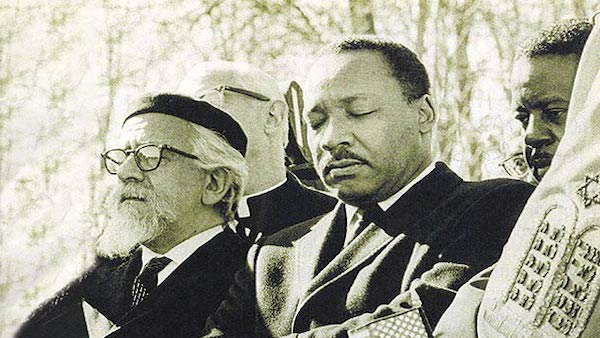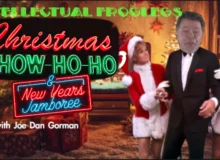Many of the recent anti-Semitic attacks in New York and New Jersey are being committed by African-Americans. What makes it totally crazy is the alliance between blacks and Jews that was forged between two great men during the Civil Rights fight during the 1960s. African-American Antisemitism.
At the first conference on religion and race, the main participants were Pharaoh and Moses. The outcome of that summit meeting has not come to an end. Pharaoh is not ready to capitulate. The Exodus began, but is far from having been completed.
These were the words with which Rabbi Abraham Joshua Heschel opened his address at the 1963 National Conference on Race and Religion, in Chicago. It was at that same conference that Rabbi Heschel first met the Reverend Dr. Martin Luther King Jr., who was the keynote speaker at this national gathering. The two became close friends and allies working together for equality and justice until Reverend King was murdered in 1968.
Describing Heschel as “one of the great men of our age, a truly great prophet”, Martin Luther King declared: “He has been with us in many struggles. I remember marching from Selma to Montgomery, how he stood at my side…I remember very well when we were in Chicago for the Conference on Religion and Race…to a great extent his speech inspired clergymen of all faiths to do something they had not done before.”
Reverend King knew that the only way his dream would ever be realized is to invite people of all colors and beliefs to join him, and Rabbi Heschel knew that the struggle for civil rights was a holy one. The two prophets of different faiths soon became fast friends.
During a January 1963 speech, the Rabbi compared the civil rights battle to Moses’ fight against Pharaoh and later on explained.
Few of us seem to realize how insidious, how radical, how universal an evil racism is. Few of us realize that racism is man’s gravest threat to man, the maximum of hatred for a minimum of reason, the maximum of cruelty for a minimum of thinking.
In June of the same year, he sent a telegram to President Kennedy that said:
“Please demand of religious leaders personal involvement not just solemn declaration. We forfeit the right to worship God as long as we continue to humiliate Negroes. Church and Synagogue have failed. They must repent. Ask of religious leaders to call for national repentance and personal sacrifice. Let religious leaders donate one month’s salary toward fund for Negro housing and education. I propose that you Mr. President declare state of moral emergency. A Marshall plan for aid to Negroes is becoming a necessity. The hour calls for moral grandeur and spiritual audacity.”

When the Reverend Martin Luther King Jr. made his famous march to Selma, Alabama, he walked hand in hand with many Jews, including his close friend Rabbi Abraham Joshua Heschel. When he made stood at the Lincoln Memorial and said, “I Have A Dream,” King close friend Rabbi Heschel and a contingent of Jews were there with him.
Martin Luther King, Jr., said in 1965:
How could there be anti-Semitism among Negroes when our Jewish friends have demonstrated their commitment to the principle of tolerance and brotherhood not only in the form of sizable contributions, but in many other tangible ways, and often at great personal sacrifice. Can we ever express our appreciation to the rabbis who chose to give moral witness with us in St. Augustine during our recent protest against segregation in that unhappy city? Need I remind anyone of the awful beating suffered by Rabbi Arthur Lelyveld of Cleveland when he joined the civil rights workers there in Hattiesburg, Mississippi? And who can ever forget the sacrifice of two Jewish lives, Andrew Goodman and Michael Schwerner, in the swamps of Mississippi? It would be impossible to record the contribution that the Jewish people have made toward the Negro’s struggle for freedom—it has been so great.
Rev. King was also a strong supporter of Israel and Zionism, the Jewish desire for a homeland. Perhaps his most famous Pro-Zionism words were uttered at a dinner which took place at the Cambridge home of Martin Peretz, then a professor at Harvard, and reported by Martin Kramer:
Shortly before he was assassinated, Martin Luther King, Jr. was in Boston on a fund-raising mission, and I had the good fortune to attend a dinner which was given for him in Cambridge. This was an experience which was at once fascinating and moving: one witnessed Dr. King in action in a way one never got to see in public. He wanted to find what the Negro students at Harvard and other parts of the Boston area were thinking about various issues, and he very subtly cross-examined them for well over an hour and a half. He asked questions and said very little himself. One of the young men present happened to make some remark against the Zionists. Dr. King snapped at him and said, “Don’t talk like that! When people criticize Zionists, they mean Jews. You’re talking Antisemitism!”
King and Heschel became best friends. In fact, Rev. King was due to come to the Rabbi’s house to attend a 1968 Passover seder. But sadly a week before the holiday, On April 4, 1968, James Earl Ray killed Martin Luther King Jr. with a single shot fired from his Remington rifle, while King was standing on the second-floor balcony of the Lorraine Motel in Memphis, Tennessee.
After the murder of Martin Luther King Jr., the leadership of the Civil Rights movement was inherited by people like Jesse Jackson, who saw the Jews as their competition for achieving middle-class status. Black leaders such as Jackson, Andrew Young, and Louis Farrakhan went public with anti-Semitic comments. As it spread, the hatred didn’t infest all Black Americans, but those on the liberal side of the aisle.
In his book Race Matters, Activist Cornel West contends there were no good times where “blacks and Jews were free of tension and friction.” West says that the 1960s period of black–Jewish cooperation is often downplayed by blacks and romanticized by Jews: “It is downplayed by blacks because they focus on the astonishingly rapid entry of most Jews into the middle and upper-middle classes during this brief period—an entry that has spawned… resentment from a quickly growing black, impoverished class.
Aided by the resentment of a Jewish middle class, the hatred generated by the leaders of the African-American community like Jackson and Farrakhan spread to their flocks, and these once allied groups began to spread apart.
In 1968 there was a fraying of the former alliance in NYC. The new community-controlled school board in the mostly black Ocean Hill-Brownsville section of Brooklyn summarily dismissed 18 white teachers and administrators. The school board’s action led to a series of citywide teacher strikes led by the Jewish UFT (United Federation Of Teachers) Leader Albert Shanker. The atmosphere was poisoned by African-American anti-Semitism directed at the many Jewish members of the UFT. Anti-Semitic catcalls were shouted by protesters and appeared in newspapers put out by the Afro-American Teachers Association. A student’s anti-Semitic poem was read on the radio
Adding to the divisiveness were the leaders of the South African anti-Apartheid movement who traveled throughout the United States as conquering heroes, and spreading Jew-hatred. For example, in 1984, Desmond Tutu publicly complained about American Jews. Tutu accused Jews of exhibiting “an arrogance—the arrogance of power because Jews are a powerful lobby in this land and all kinds of people woo their support,”(Jewish Telegraphic Agency Daily News Bulletin, Nov. 29, 1984). Speaking in a Connecticut church in 1984, Tutu said that “the Jews thought they had a monopoly on God; Jesus was angry that they could shut out other human beings.”
The Affirmative Action movement further divided the two allies. In the 1970s, blacks began seeking ways to build on the civil rights act by pushing policies that support members of their disadvantaged group that has previously suffered discrimination. Jews fought against Affirmative action believing everything should be based on merit only.
1979. Andrew Young, then Jimmy Carter’s ambassador to the United Nations, violated administration policy, and met with a representative of the Palestine Liberation Organization. Almost immediately, Young was gone. By most accounts, he was asked to resign because he had deceived the State Department—but black leaders saw a Jewish conspiracy. Young’s dismissal, said Jesse Jackson, was a “capitulation” to Jews. For over a month, while blacks castigated Jews,
An article in Commentary called The Andrew Young Affair outlined the PLO incident plus anti-Semitic comments and acts by Young.
The dice had been cast. The love affair between Jews and Blacks fomented by the Reverend Martin Luther King Jr. and Rabbi Abraham Joshua Heschel was fractured by Dr. King’s successors. And the next generation sealed the hatred.
Al Sharpton was a low-level civil rights leader who was looking to become “big time” by using Jews as his scapegoat. During the Twana Brawley hoax, he said that Brawley telling her story to the State’s Attorney General Robert Abrams who was Jewish would be “like asking someone who watched someone killed in the gas chamber to sit down with Mr. Hitler.”
On July 20, 1991, Leonard Jeffries of City College who had a history of anti-Semitic slurs presented a two-hour long speech claiming “rich Jews” financed the slave trade, Jews control the film industry (together with Italian mafia), and use that control to paint a brutal stereotype of blacks. Jeffries also attacked Diane Ravitch (Assistant Secretary of Education), calling her a “sophisticated Texas Jew,” “a debonair racist,” and “Miss Daisy.”[as in Driving Miss Daisy].

Jeffries’ speech received enormous negative press, especially from the leaders of the Jewish community who wanted Jeffries fired for the bigotry. He was fired as chairman of the black studies program but allowed to stay on as a professor. His position of chairman was restored after he sued the school, but the supreme court made the lower court reverse the decision two years later.
With each new criticism of Jeffries, leaders in the New York African-American community rushed to Jeffries’ defense. NYC’s two black newspapers, as well as black radio station WLIB, joined activists such as Al Sharpton, Colin Moore, C. Vernon Mason, Sonny Carson, and Lenora Fulani to showcase their approval of Jeffries’s “scholarship.” At the same time, they denounced the Jews who criticized Jeffries Antisemitism as race-baiters.
On August 18th, 1991, speaking about the growing Jeffries controversy, Al Sharpton made his famous comment “If the Jews want to get it on, tell them to pin their yarmulkes back and come over to my house.”
The Day after he told Jews to pin their yarmulkes back, a car in the motorcade of the Lububcher Rebbe Schneerson accidentally jumped the curb and killed a young black child Gavin Cato. The local community that had been listening to their local media put down the Jews for a month didn’t believe it was an accident, and thus the Crown Heights riot began. According to the New York Times, more than 250 neighborhood residents went on a rampage that first night, mostly black teenagers, many of whom were shouting “Jews! Jews! Jews!”
Sharpton wasn’t there on the first night when a Jewish Yeshiva student from Australia named Yankel Rosenbaum was killed. But seeing the possibility of becoming a national leader, he joined in on day two and attacked the Jews.
On the second day of the Crown Heights riot, according to the sworn testimony of Efraim Lipkind, a former resident of Crown Heights, Sharpton started agitating the crowd. “Then we had a famous man, Al Sharpton, who came down, and he said Tuesday night, kill the Jews, two times. I heard him, and he started to lead a charge across the street to Utica [avenue]. On the third day of the pogrom, Al Sharpton and Sonny Carson led a march of protesters chanting, “No Justice, No Peace!,” “Death to the Jews!” and “Whose streets? Our streets!” The mob displayed anti-Semitic signs and burned an Israeli flag.
Sharpton rode on the back of his scapegoating the Jews to become a national figure. But what he left behind was furthering the divide between Jews and Blacks,
According to the liberal ADL, between 2007 and 2016, African American Antisemitism was almost twice that of the general community. While these numbers are frightening, it is essential to note that the majority of African Americans are NOT anti-Semitic.

At the end of 2019, there was a rash of anti-Semitic incidents in the NY City metropolitan area conducted by African Americans. The worst cases were the machete attack in a Rabbis House during a Hanukkah Party in Monsey, NY. Two weeks earlier, there was an Antisemitic shooting attack by two African Americans at a kosher grocery store in Jersey City. The shooting was followed by anti-Semitic comments by African-Americans in the Jersey City community, including one by a member of the school board.
How do we reverse the hatred? How do the Jewish and African American communities go back to the days of Rabbi Heschel and Dr. King?
Leadership! I am not an expert on African American leaders. Still, I suspect the issue with them is similar to that of the American Leadership The majority of leaders of the American Jewish Community in America don’t care about anti-Semitism or mending fences with their previous leaders. Their priority is pushing the progressive goals of the Democratic Party—right or wrong. That’s why so many Jewish leaders kiss up to the anti-Semitic Al Sharpton, were silent about Barack Obama’s Antisemitism, didn’t force Hillary Clinton to address her anti-Semitic comments or allow the House Democrats to get away with their BDS support and their refusal to condemn Ilhan Omar for Antisemitism and so on. Their only fight against Antisemitism is a false one. They contend that Donald Trump, the most pro-Jewish president in recent decades, is an anti-Semite.
I have never met a conservative African American who hated Jews. I suspect that Black leadership like the Jewish leaders put progressive politics before the needs of their people
If Jews demanded their leadership addressed the needs of their people as a priority over liberal politics and African Americans demand the same from their leadership, it would be one giant step toward bringing back the friendship of the 1960s.
UPDATE: Last month an Israel student took a New York subway and got assaulted by an African-American woman yelling anti-Semitic taunts at both her and an Orthodox Jewish man riding in the same car. The offending woman was arrested. Ed Morrisey is reporting at Hot Air that the DA is refusing to charge the offender with a hate crime. Ed investigated the issue and posted a must-read exclusive report you can find by clicking here. African-American Antisemitism. African-American Antisemitism. African-American Antisemitism. African-
American Antisemitism. African-American Antisemitism. African-American Antisemitism. African-American Antisemitism. African-American Antisemitism. American Antisemitism. African-American Antisemitism. African-American Antisemitism. African-American Antisemitism. African-American Antisemitism.






